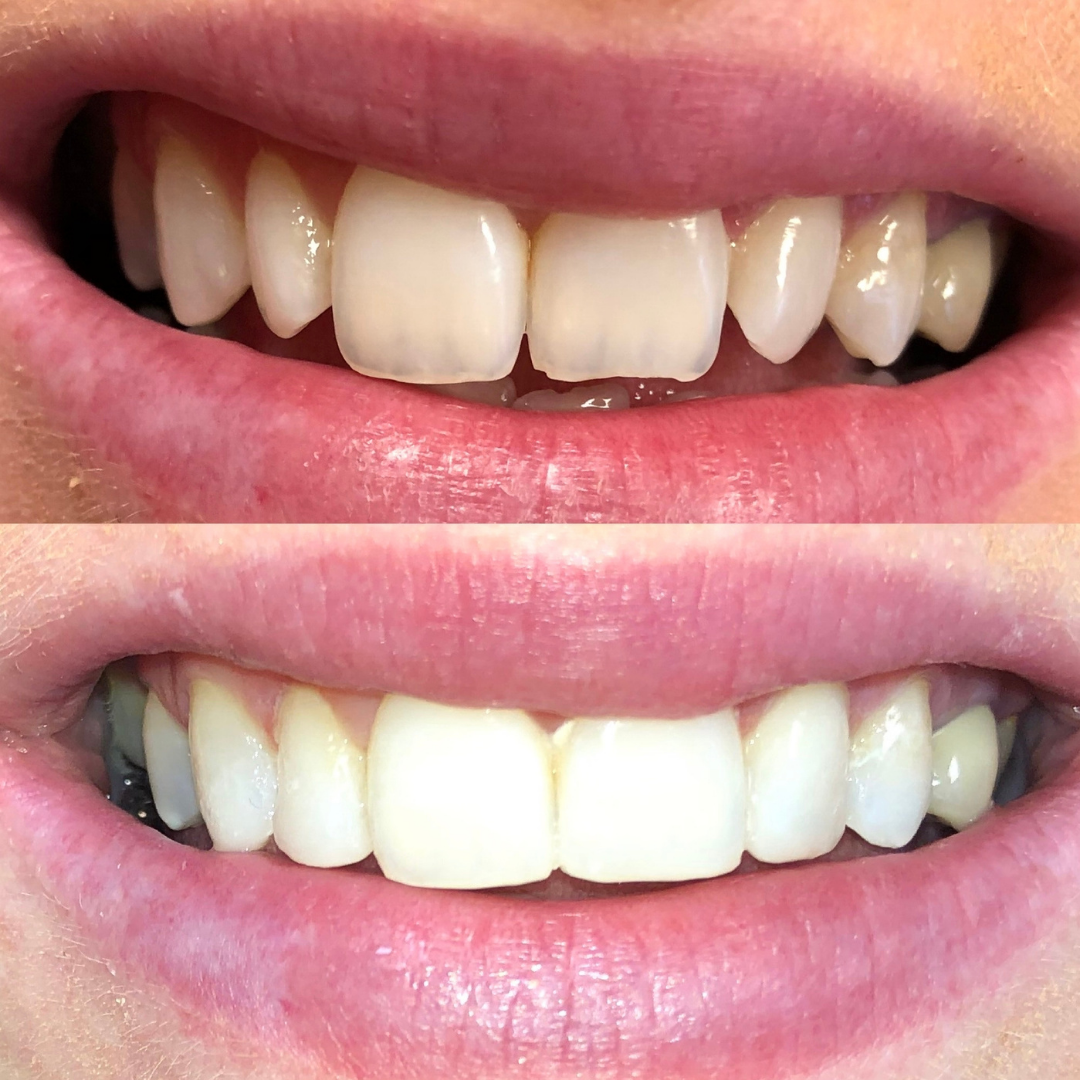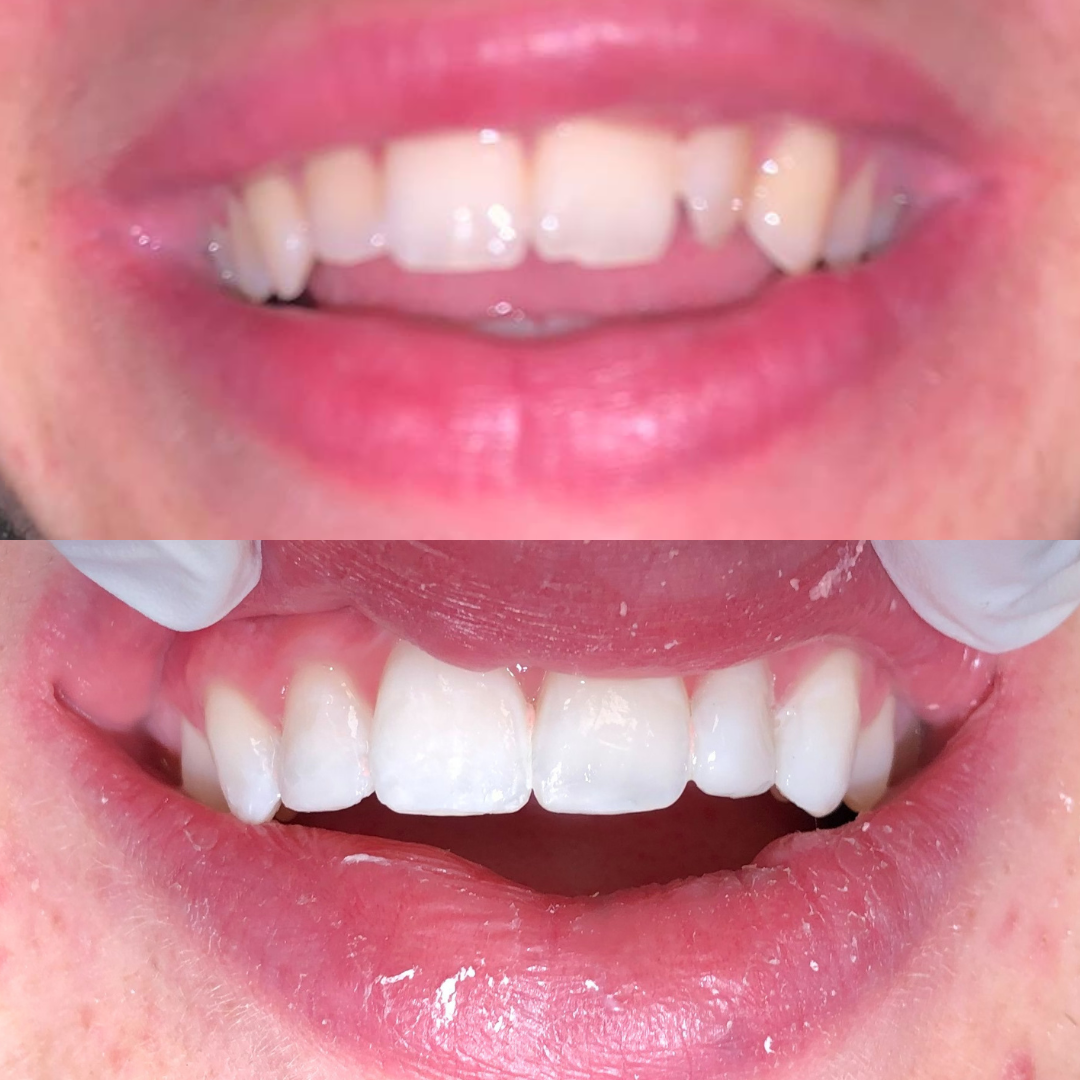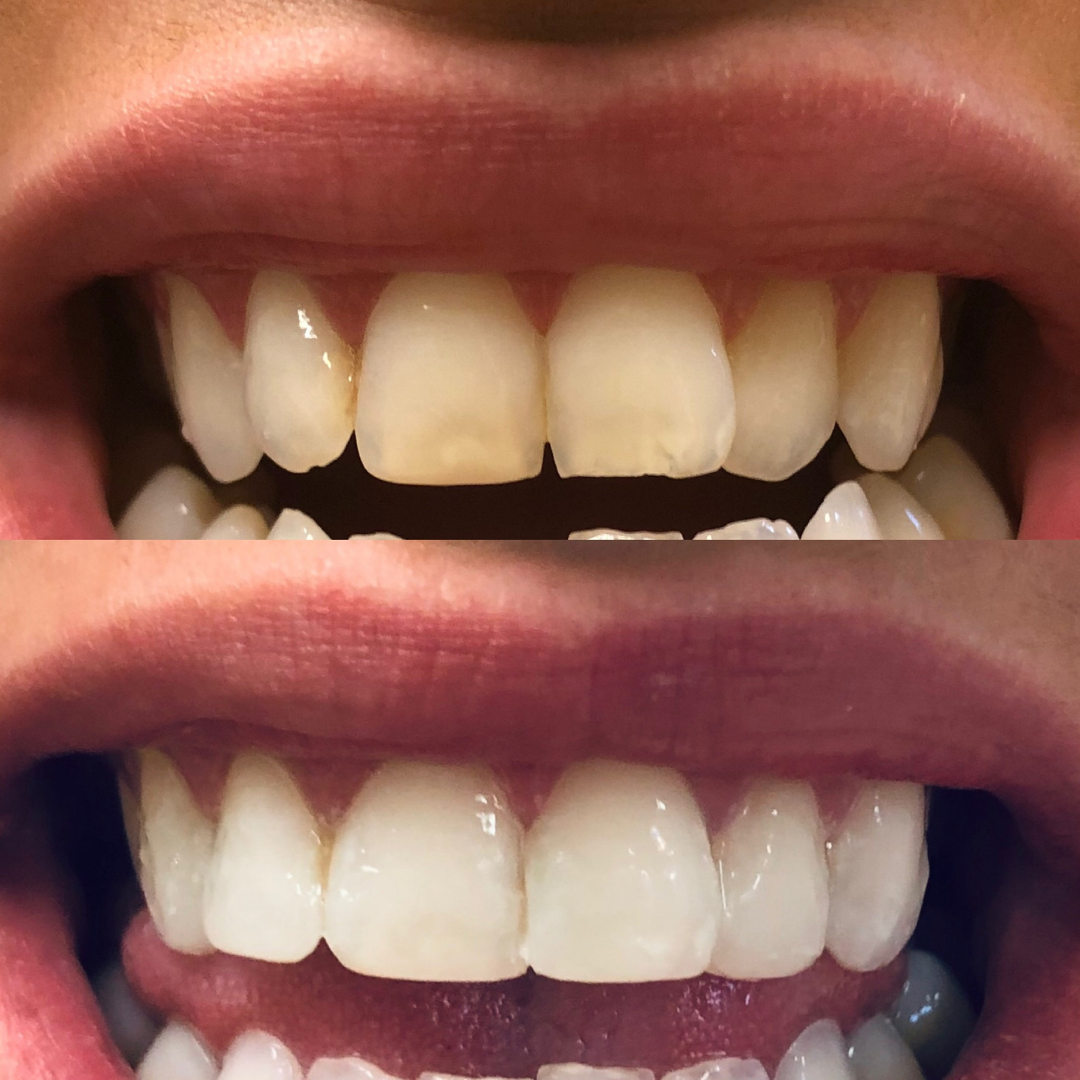Teeth Whitening
Teeth whitening refers to any treatment involving lightening the shade of your natural tooth. There are treatments and products readily available to purchase which claim to whiten your teeth. Many of these products, even those endorsed by others are entirely ineffective and are only able to remove surface staining. When your dentist talks about teeth whitening, they are referring to treatments that will actually lift, whiten, or brighten the shade of the tooth when comparing it to a colour chart/shade guide. There are 2 main treatment modalities available to you when attending the dentist. These are a home tooth whitening kit, and an in surgery whitening procedure. Teeth whitening is a dental treatment and is only legally allowed to be carried out by a registered dental professional.
Results



How Does Teeth Whitening Work?
In scientific terms teeth whitening works by invoking a chemical reaction inside your tooth. Carbon bonds existing in tooth structure are broken down by the substance contained in whitening gel. These reform in a different way, making the tooth appear whiter as a result.
Your teeth will have a natural shade based on genetics and development of the dental tissues. This natural shade may be darkened by lifestyle habits.
The part of the tooth which gives it its colour is the dentine, which is the layer underneath the enamel on the outside of your tooth.
If your enamel has worn away, the dentine will show through, and it is prone to discolouration.
The enamel itself may be affected by staining. There are 2 types of staining: intrinsic and extrinsic.
Intrinsic staining occurs inside the tooth for different reasons such as a dead tooth nerve, a genetic malformation, the development of tooth decay.
Extrinsic staining occurs when our teeth are affected by dietary stains, and tooth wear. Both types of staining are amenable to tooth whitening.
There are different variations of tooth whitening gel. Some are formulated for daytime use and act quickly. Some are made for overnight use and have a longer acting time.
There are specific gels to use in cases of ‘non vital bleaching’ when your tooth nerve has died, which can cause the tooth to discolour.
All types are available with us and we will discuss what is best for you.
How About Teeth Whitening Toothpastes?
Teeth whitening toothpastes are ineffective at whitening your teeth as they do not contain the appropriate substances needed to lighten the tooth.
They may have the ability to reduce surface staining, making your tooth appear slightly whiter, however you MUST be careful and consult with your dentist before purchasing over the counter products. Many of these contain abrasive substances and may actually be harmful to your teeth.
No over the counter products are permitted to contain the level of hydrogen peroxide required to incite a difference in your tooth colour.
Using a tooth whitening paste that contains no fluoride, or abrasive molecules could be of detriment to your oral health.
Preparation Before Your Teeth Whitening Appointment
Before your teeth whitening appointment we want to ensure your teeth and gums are healthy. When you come into our clinic we will do a detailed assessment and ensure your oral health is adequate. Dr Olivia will ensure you are suitable for the treatment when she carries out her assessments. If you are already a regular attender at another dental practice, please attend your check ups and hygiene appointments as normal prior to embarking on your teeth whitening journey. You may register with Dr Olivia for all routine care should you wish to.
If you have any outstanding dental treatment, this must be completed before considering cosmetic work. Dr Olivia will be happy to assess and treat your dental needs if they are not being met or you do not have a general dentist.
Your teeth and gums will need to be clean before starting tooth whitening, as any coating of plaque or calculus on the teeth will stop the treatment from being effective.
If you have any loose or lost restorations, these will need to be addressed.
You may want to keep a food diary which you can present to Dr Olivia. She will go through this with you to determine whether your diet is having an impact on your tooth colour, and oral health.
Brushing twice each day and using dental floss or interdental brushes are important if considering whitening treatment.
Custom Home Teeth Whitening Kit
This method of teeth whitening is extremely safe and effective when planned and implemented by Dr Olivia. You may be tempted by online deals for tooth whitening kits, which can be dangerous for you and your teeth. These kits are bespoke made and so may not fit your teeth properly, risking damage to your gums and even risk you ingesting the whitening material. The gels may contain unsafe ingredients.
At our practice you will be fully screened for oral health problems.
Once Dr Olivia is satisfied your teeth and gums are healthy, she will make trays to accurately fit your teeth. This will ensure any gel used contacts your teeth directly, without spilling into the oral cavity where it could be harmful in excess quantities.
We will supply you with gel to whiten your teeth.
There are two main types that can be grouped into daytime or nighttime use. This is because the chemical released which whitens your teeth can be fast acting, ie hydrogen peroxide, or slower releasing, ie carbamide peroxide. Both are equally effective at whitening your teeth, but the speed of onset and duration of action differ.
You can decide with Dr Olivia what suits you the best for your treatment outcome.
You will be shown how to use the trays, how to store and care for them.
You will be given detailed instructions for use, including application, wear times, dos and don’ts whilst undergoing the treatment.
You must not eat or drink whilst using the trays. You must brush your teeth before and after use. Be especially careful not to immerse your trays in hot water, as this can warp the shape and affect the fit of the trays.
This type of whitening can be done daily, or with breaks in between. It will take approximately 2-4 weeks to complete a course.
Upon completion, you may simply store the trays and gels for top up use at a later date.
In-House Teeth Whitening
This is similar to the home bleaching method, but involves the activation of the whitening gel using a stimulant in surgery. This is usually a blue light/laser which activates the gel, increasing the speed at which your whitening occurs.
This method must be planned and closely monitored by a dentist.
The treatment is usually completed in a single appointment, allowing you to gain fast results.
Teeth Whitening Expectations
There are no guarantees to ensure your teeth reach a certain shade of whiteness. That being said, dental teeth whitening is a very predictable procedure and your dentist can advise you on realistic expected outcomes.
With either method of teeth whitening described above, the time frame for expectation of your final outcome will depend on your starting shade, and the cause of the discolouration.
In some rare instances where there is a genetic component to your discolouration or if you have been exposed to certain antibiotic medicines affecting your teeth (a common example is tetracycline staining) you may require longer term treatment to see results.
In rare cases if your treatment isn’t as effective as you would want, you may need to consider alternative treatments.
For most cases of tooth whitening involving healthy teeth, you can expect a whitening result which is several shades whiter than your starting colour.
Dr Olivia will take note of your initial shade and may document this with pictures. We would encourage you to take preoperative photographs in natural light which you can use to compare with your final result.
What To Expect After Teeth Whitening
After your teeth have been whitened, you can expect the results to last up to a year before any topping up is required. This varies from person to person and will be impacted upon by your own habits and aftercare regimen.
Any sensitivity that may have developed alongside the treatment should have settled within a short period. If this persists, please contact your dentist.
If you had any white restorations or crowns, veneers on teeth visible within your smile, now is the time to have these replaced. Whitening will brighten natural teeth but will not have an impact on old restorations or ceramic work.
If trays have been made these need to be stored in a cool dry place, ready for use again. These will last many years if appropriately looked after.
Place them in a bright case to avoid misplacement.
Possible Side Effects of Teeth Whitening
Teeth whitening with Dr Olivia at our clinic is a very safe procedure and risks are rare. During your treatment you may experience some sensitivity. This is more likely if you suffered from sensitivity before undergoing the procedure.
The sensitivity experienced is entirely temporary, and is not a permanent effect.
If experienced it is most commonly mild sensitivity to cold drinks. In rare cases you may feel spontaneous twinges of sensitivity whilst the whitening gel is in contact with your teeth, or in the hours afterwards.
In order to minimise this risk we recommend using the tiniest amount of whitening gel possible to cover the surface of your tooth, and we will demonstrate this at the clinic. We recommend using a sensitive toothpaste alongside your procedure, which we can provide you with samples of. We recommend avoiding very hot or very cold liquids in the 24 hours after you have been whitening your teeth (or had your clinic whitening). You must ensure to remove excess gel if it spreads out of the tray.
Irritation to your gums is a possibility if tooth much gel is used, or if gel is allowed to spill out from the tray. The trays made at our clinic are bespoke and perfectly matched to your teeth, so this risk is minimised.
Any excess gel must be removed using a cotton bud or tissue, which will ensure the gums are protected. If gel is in contact with your gums for an extended period, they may feel irritated and look inflamed. This should pass if you follow advice from our dentists.
An extremely rare risk is called ‘resorption’. This is an uncommon risk, and generally only seen post orthodontic treatment which has put previous pressure on your teeth.
If you suffer from white spots on your teeth, these may appear whiter at first and look worse than when you started the treatment. This is a temporary effect due to dehydration of the tooth, and the white spots will actually blend better with the whitened tooth when everything settles.
Tooth Sensitivity
As mentioned above this is a temporary side effect and if you suffer from it, it will reduce once a day or two has passed since your treatment. In order to minimise this please follow clinic advice. If you have any concerns, please call the clinic.
Gum and Soft Tissue Irritation
As part of your initial assessment Dr Olivia will thoroughly check your teeth and gum health. If there are any concerns about the health of your gums or oral soft tissues, these will be addressed before you undergo your treatment.
In the case of in house whitening treatment, your gums will be protected by isolating them when the gel is applied (by means of a barrier or cotton wool isolation as appropriate). The dentist will ensure they are protected during the treatment, and advise you about aftercare accordingly.
If you are whitening your teeth as home as prescribed by our dental team, we will advise you appropriately on how to protect the gums when undergoing the treatment. Any excess whitening gel should be immediately removed if it flows over the tray into the gum region.
If the whitening gel does come into contact with your gums, irritation may occur. In this instance we would advise you to seek advice from our clinic should it be more than just mild irritation. If the irritation is mild, you can take painkillers, apply cool water to the area, or apply a soothing oral gel if indicated. The irritation should improve within a day or two of the event.
Existing Restorations, Crowns and Veneers
When you come to our clinic you will be advised if Dr Olivia has any concerns about factors affecting your treatment outcome.
In the case of you having restorations to your teeth, this may have an impact on your result. Restorations (fillings, white or silver), crowns (caps) and veneers will not whiten with the treatment. Your own natural tooth tissue will whiten, but these will not. This doesn’t mean that you can’t whiten your teeth if you have such restorations, however if your teeth become a lot whiter these may stand out as being the original shade of your teeth. You may need to have these replaced if so. This is usually done after your treatment, as long as the restorations are sound and sealed, as we can’t predict what colour/shade you will be at the end.